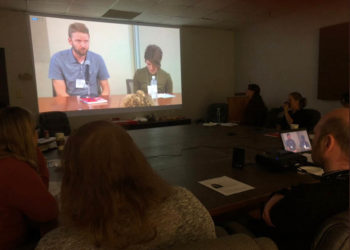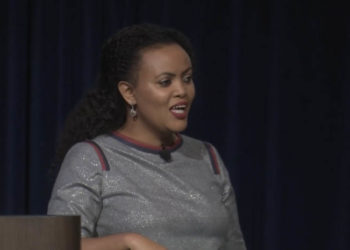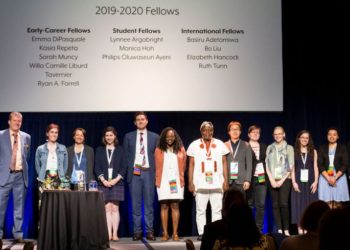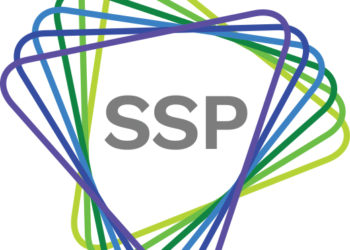As someone who attends at least five or six scholarly communications and infrastructure conferences each year, in theory I should be very skeptical of the need for more. But, in fact, I’m finding that some of the newer meetings I’ve been attending recently are among my favorites. Perhaps it’s because these late entrants to the wonderful world of scholarly communications conferences realize that they have to make more of an effort in terms of content, format, and diversity of participants. And/or perhaps the changes that we’re witnessing in our community have highlighted some genuine gaps in the traditional round of conferences.
Whatever the reasons, I’d like to share with you some information about five of the new(ish) wave of meetings for our community and my thoughts on why — based on my own experience and/or that of colleagues and friends — they are likely to stay the course.
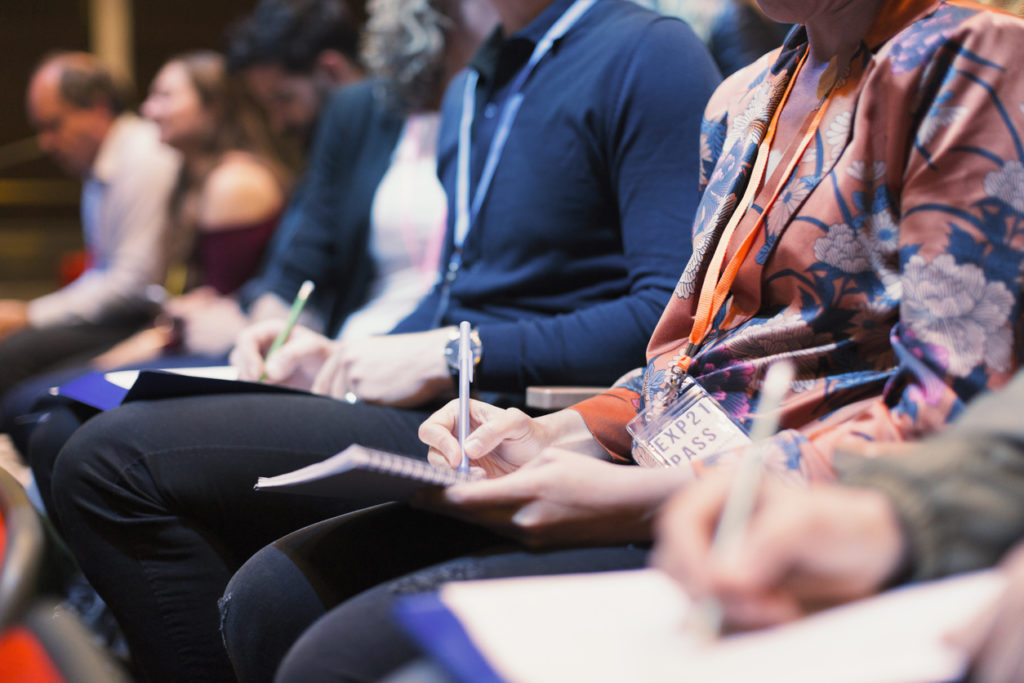
In the order in which they happen, first up, and near and dear to my heart, is PIDapalooza (Lisbon, Portugal – January 29-30, 2020). This annual “open festival of persistent identifiers,” co-hosted by California Digital Library, Crossref, DataCite, and my former organization, ORCID, does what it says on the can. Rather than following the traditional conference format of 60-90 minute sessions with formal presentations and panel discussions, PIDapalooza is a fun and fast-paced meeting with three parallel tracks of 30-minute sessions with an emphasis on audience interaction, discussion, and Q&A. The festival theme is taken quite seriously — from the name badges and wristbands, to a PIDapalooza playlist and local performers! Originally intended to bring together people in the community who are already familiar with persistent identifiers, whether as creators, curators, or consumers, PIDapalooza also set out to challenge the idea that research infrastructure is a bit, well, boring. Four years on I’d say that it has pretty much proved its point; it has become a fixture on many PID people’s calendars. So, if you’re interested in how persistent identifiers are being — or could be — used to build and maintain a more robust research information infrastructure, and if you’re willing to throw yourself into the PIDapalooza spirit, then this is the meeting for you.
Somewhat unfortunately, the next two meetings take place at the same time next year (though hopefully this won’t be the case in future). The first NISO Plus conference and the fifth Researcher to Reader conference are both scheduled for late February 2020.
Researcher to Reader (London, England – February 24-25, 2020) is the increasingly popular successor to what used to be the annual conference of the Association of Subscription Agents & Intermediaries (ASA). I’ve never attended either meeting myself, but feedback on R2R has been very positive, and I’ve also heard lots of good things about it from friends and colleagues who have participated. It aims to be “the premier forum for discussion of the international scholarly content supply chain – bringing knowledge from the Researcher to the Reader,” and it does so by encouraging collaboration and conversation between those working across the whole spectrum of scholarly communications (from researcher to reader!). R2R takes a multidisciplinary approach and attracts a high caliber of speakers from around the world. There is a strong emphasis on networking, as well as many other opportunities for interaction, including a choice of five different workshops, each of which meets three times over the two days to discuss their chosen topic
NISO Plus (Baltimore, MD, USA – February 23-25, 2020) grew out of the NISO/NFAIS merger earlier this year (full disclosure, I have recently joined NISO as their Director of Community Engagement). It’s a version of what used to be the NFAIS annual conference (which I also never attended), but in what we hope will be a new and exciting form. We want NISO Plus to bring together a much wider range of organizations and functions than most scholarly communications events — not just publishers, vendors, and librarians, but also archivists, product managers, metadata specialists, electronic resource managers, and others who are often left out of the wider conversations in our industry. And we are experimenting with a slightly different format — each of the topic sessions will be followed immediately by a lengthy discussion period, so that attendees and presenters can dive more deeply into the issues being covered, discuss their concerns, suggest possible solutions, and agree some concrete next steps. Our hope is that NISO Plus will help us collectively identify and solve our community’s existing problems and, even more importantly, to kickstart the conversations we need to be having in order to prevent future problems from occurring.
Next up is Transforming Research, held annually in September/October since 2017, most recently in Washington, DC, USA at the Institute for International Science and Technology Policy (and currently seeking a host for 2020). I attended the 2018 meeting, hosted by Brown University, and was impressed by the range of speakers and topics, both of which were a bit different from more traditional meetings. That’s because the organizers cast their net quite widely in terms of both speakers and attendees, in order to explore research communication both within our community and with those who benefit from it, such as patients, policymakers, and the broader public. Transforming Research’s goal is to address the pressures, policies, and opportunities that drive transformation of the global research endeavor — with a particular focus on research impact. For example, the most recent meeting included a keynote by Carlos de Brito Cruz, Scientific Director of São Paulo Research Foundation (FAPESP), Brazil and Chair of the Global Research Council, who spoke about his own research on how research is evaluated. Unlike the other conferences covered here, all TR sessions are plenaries, the approach is similarly inclusive. Everyone is invited to share their own perspectives and insights, and time is built into the schedule to enable debate and discussion between speakers and the audience — according to fellow Chef, Charlie Rapple, it really works!
The last meeting on my list — the FORCE11 annual conference — is also the most well-established, having recently celebrated its fifth anniversary (Edinburgh, Scotland – October 15-17, 2019; the next is in Donostia San Sebastián, Spain – October 19-21, 2020). Having attended this meeting in 2017 and 2018, I think that, intentionally or not, it is in many ways a role model for this new wave of scholarly communications events. A self-described “community of scholars, librarians, archivists, publishers and research funders that has arisen organically to help facilitate the change toward improved knowledge creation and sharing,” FORCE11 has embraced the notion that collective action is the best approach if we really want to effect the changes that are needed in scholarly communications. Their meetings do a great job of bringing together individuals and organizations with different perspectives to tackle common problems. They emphasize inclusion, diversity, and the value of open discussion, where everyone’s views are equally welcome, and the sessions are typically inclusive, informal, and interactive.
So, will these meetings become fixtures on our annual calendar of must-attend events? I hope and believe the answer is yes. Because what they all have in common is a much-needed focus on inclusion — bringing together parts of our community that don’t often have opportunities to interact with each other to share their experiences and learn from one another in a relatively intimate setting (100-250 people). And to do so in ways that are more intentionally interactive than many of the more well-established meetings. That’s not to say that other industry conferences are failing in these respects. For example, the SSP annual meeting (Boston, MA, USA – May 27-29, 2020) stands out as being especially welcoming to a wider range of functions and career levels than most other meetings, while APE (Berlin, Germany – January 13-15, 2020) has done a great job of including funders and policy-makers. But these newer meetings have all been launched specifically to encourage and support engagement with the widest possible range of participants in scholarly communications, and to do so in unusual or innovative ways. Rather than serving up more of the same, which the more established conferences already do well, they are seeking new ways to engage. And in doing so, they are enabling new voices to be heard, whether as speakers, participants, or organizers. That’s got to be a good thing!
So, what do you think? Will you be adding any of these to your own calendar of events? Do you have any feedback you’d like to share about your own experience attending them? And do you have any recommendations for other new(ish) meetings that I and The Scholarly Kitchen’s readers may not know about? I look forward to hearing your comments!
Discussion
16 Thoughts on "Room For One More? (Conference, That Is)"
I feel like conferences are getting smaller and more local, which is a good thing; some of the best ones I’ve ever been to are country-specific, have fewer than 80 people, and really spur action. Some of the traditional ones have the same speakers and topics every year. But I love FORCE11 though and of course PIDapalooza. FORCE does the best job of being determinedly globally-inclusive IMHO, locally-tailored to and run by people in whichever country is hosting, and it also facilitates usable outputs. And I’d add a plug for OpenCon and specifically the various satellite events; these are notable because they really are self-organizing and properly community-led, although it spans more than just our space of course. The most fun for me (although not really a conference) is Pint of Science!
Thanks Ginny and I agree re FORCE11 – I really do think it’s a role model (perhaps even progenitor?) of the other newer meetings. And thanks for the other suggestions – I’d never heard of Pint of Science but just Googled it and it sounds great (https://pintofscience.com/ if others are interested)
I am missing the international conference APE 2020 on 14-15 January 2020 in the Academy of Sciences and Humanities in Berlin. This conference started in 2006 and was the first conference bringing all stakeholders together, focussing on Academic Publishing in Europe.
APE is sold out every year. We offer a discount to SSP Members.
With best wishes for the Holiday Season.
Arnoud de Kemp
http://www.ape2020.eu
Hi Arnoud, my focus here was on newer conferences in our community (in the last five years) – admittedly not a comprehensive list though! I did mention APE at the end as one of the more established conferences that has done a good job of including non-traditional stakeholders though 🙂
Thanks Alice.
Dear Alice, Thanks for this article. It might be well to mention the Information Today Conference Calendar (http://www.infotoday.com/calendar.asp) which I maintain. I try to make it as comprehensive as possible and was glad to learn about a couple of new conferences that will go in the next update. Please keep me informed of any other new conferences that you learn about. Best wishes.
I guess that my own, doubtless selfish problem with almost all of these meetings cited is their relative (underlined) lack of interest in academic books, and in the arts and social sciences in general, rather than the communication of STEM data and ideas. There are occasional exceptions, and there are regular alternative events (like the annual AUP meeting and in the UK the IPG meetings, the biannual UP Redux meeting, and some sessions at ALPSP, as well as OASPA) where the dissemination of long-form research definitely is taken seriously (and here in the UK it is something of interest to nearly half the tenured faculty, let’s not forget) but in general arts and social science concerns do not loom large in the world Alice describes. Any more than they tend to do here on the SK, where an interest in monograph futures remains emphatically a minority pursuit, at best, despite the best efforts of a number of good friends down the years!
Not a selfish problem, Richard – thank you for raising this. You’re absolutely right that academic books tend to be overlooked in many scholarly comms conferences – and on TSK – despite their importance to many researchers in (primarily) non-STEM disciplines. As you say, there are some exceptions (FYI we are also trying to somewhat address this at NISO Plus with a handful of sessions focused on humanities, alternative formats, etc). And although Karin Wulf and others do write about this here, I know that more posts would be very welcome, so if you have any specific suggestions (people or topics) I strongly encourage you to send them along!
Hi Alice, there is also the new conferences from ConTech.Live which were launched in December 2018. It is a series of conferences that looks at how content is being transformed through data science, AI and emerging technologies. Take a look at http://www.contechlive.com, the flagship event was last week and the programme can be seen here https://www.contech-event.com/ConTech2019. We believe there is definitely room for these in an arena where the speed of change that is happening is beyond comprehension. Kind regards, Cathryn
I attended Researcher to Reader in 2019. It was interesting but ultimately had very few actual scholarly researchers or readers there. Well populated by all those in between, but – outside of invited speakers – very few researcher-readers.
FORCE11 2018 however was truly an event populated and informed by researchers. A clash meant I missed this year’s event, sadly.
This is a major challenge that R2R is actively working on. It is indeed hard to have a productive discussion about scholarly communications without researchers present and engaged, but it is also hard to get researchers to attend events that are sometimes characterised as ‘just about publishing’. As we know, researchers want to be ‘published’ but are often not very interested in the plumbing or politics of ‘publishing’. We are trying to create an attractive environment for people not used to attending such events, not just because of the researcher-friendly brand, research-relevant agenda and broad scope, but also because our highly interactive workshops ensure that new delegates are able to rapidly bond with other participants and form instant networks during the first few hours of the event. We also offer significant discounts for academics, and are making progress with encouraging publishers and others to sponsor academic participants; Research Information, for example, is sponsoring a free place for 2020.
This conference doesn’t exist but I think it should: “50 Shades of Grey literature,” a conference on grey lit.
Actually, the 21st International Conference on Grey Literature was just held in October in Hannover, Germany (the five previous conferences were in New Orleans, Rome, New York, Amsterdam, and Washington, D.C.). See http://www.greynet.org for maybe not 50 shades, but a lot of stuff about grey/gray literature. As someone who has been involved in the Technical Report Archive and Image Library (TRAIL) project (www.crl.edu/programs/trail) since its inception in 2006, digitizing, preserving and making openly accessible this particular underutilized subset of gray/grey literature is what we do.
Thanks for the additional conference suggestions and feedback, everyone (including the 50 Shades of Grey Literature 🙂 – and for flagging the Information Today calendar, Donald. I wasn’t aware of that and it sounds like a great resource.
Hi Alice, Thanks for this great post. Another new conference is ITHAKA’s Next Wave, which focuses on the largest strategic issues facing academia for an invited audience of leaders in scholarly publishing and academic libraries. Program information is available here: https://www.ithaka.org/conference
The company that runs the Grey Literature conference is called TextRelease (http://www.textrelease.com/home.html), and as Mel noted, the 20th one was held in October in Hannover, Germany. The next one has not been announced yet. I went to one of the previous ones and found it very useful.
Don Hawkins
